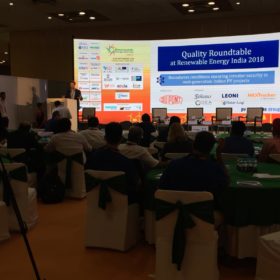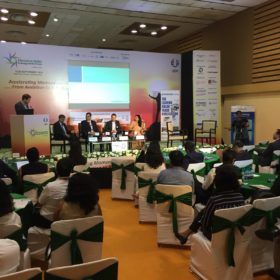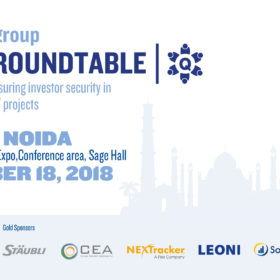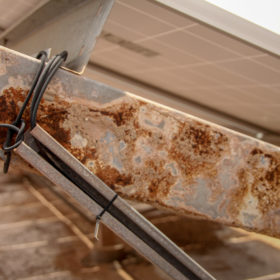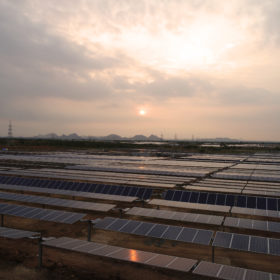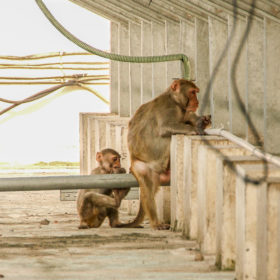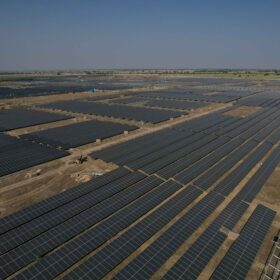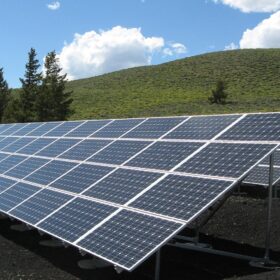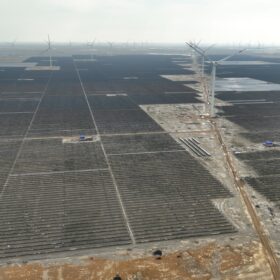Video: Quality Roundtable REI 2018
pv magazine’s Quality Roundtable at this year’s Renewable Energy Expo India (REI), attracted analysts and experts from across the industry, who gathered in Greater Noida to discuss the challenges and opportunities present in the massive Indian solar market.
Better bifacial adoption, catalyzing innovation focus of Future PV Roundtable at REI
pv magazine’s Future PV Roundtable, held at the 2018 Renewable Energy India (REI) Expo in Greater Noida, discussed how India can better adopt bifacial solar cell and module technology – the future of power generation. Prominent industry speakers also put forth their views on how standards can catalyze solar innovation for India-specific challenges, and on PV materials and components for enhanced module efficiency and recycling.
pv magazine Quality Roundtable, REI: Innovation, investment and improving PV installs
pv magazine’s Quality Roundtable at the 2018 Renewable Energy India (REI) Expo, took place in front of a packed audience. It discussed current problem areas; how solar developers and solution providers can improve the quality of Indian solar PV installations; and innovative financial instruments to reduce the cost of debt and scale up infrastructure investment.
Rs2.44 solar bid equalled in Gujarat – but is it viable?
The state’s second attempt to tender for 500 MW of capacity has made a mockery of predictions of rising PV electricity prices and exonerated utility for cancelling previous procurement round. But the absence of India’s cheapest solar energy generator from the latest exercise could be telling.
Making India’s solar sector resource efficient
By adopting resource efficiency measures, the Indian PV solar manufacturing sector can reduce its material requirement from an estimated 12 million tons to 8.2 million tons by 2030. The resource-efficient approach will also increase efficiency to more than 30% from 6% in 2018, according to a study conducted under the European Union’s Resource Efficiency Initiative (EU-REI) Project.
Solar-Log makes debut in India
German solar monitoring company SDS has announced a strategic partnership with developer iPLON India. The established Solar-Log system will help India’s drive to raise quality standards in PV.
Ensuring quality will bring “reputation, prestige” to Indian PV
“Profitable yet risky”: This was one of the findings of a recent study, released in July, conducted by PI Berlin on behalf of Germany’s National Metrology Institute (PTB) when examining six Indian PV projects from the viewpoint of project quality. The report’s author Asier Ukar spoke to pv magazine in advance of his presentation on the subject at the Quality Roundtable at the Renewable Energy India conference next week.
Suzlon partners with CLP for 70 MW solar capacity in Maharashtra
CLP India will acquire a 49% stake in Suzlon’s 50 MW and 20 MW solar projects in Dhule, Maharashtra. These two projects were won by Suzlon through competitive bidding in auctions by the Solar Energy Corporation of India Limited (SECI). As per the power purchase agreement signed, the tariff rate is fixed for 25 years at 4.115 INR/kWh for 20 MW and 3.66 INR/kWh for 50 MW.
Government focuses on PV quality concerns
The award of the nation’s first solar project quality certificate may signal a renewed determination by the federal authorities to crack down on low-quality panels – with Far Eastern imports firmly in their sights.
Quality issues in Indian PV projects jeopardizing investments – report
Inspectors from solar risk management company PI Berlin visited six projects and exposed cost-cutting in installation, non-existent warranties, serious safety concerns and improbable performance figures.
